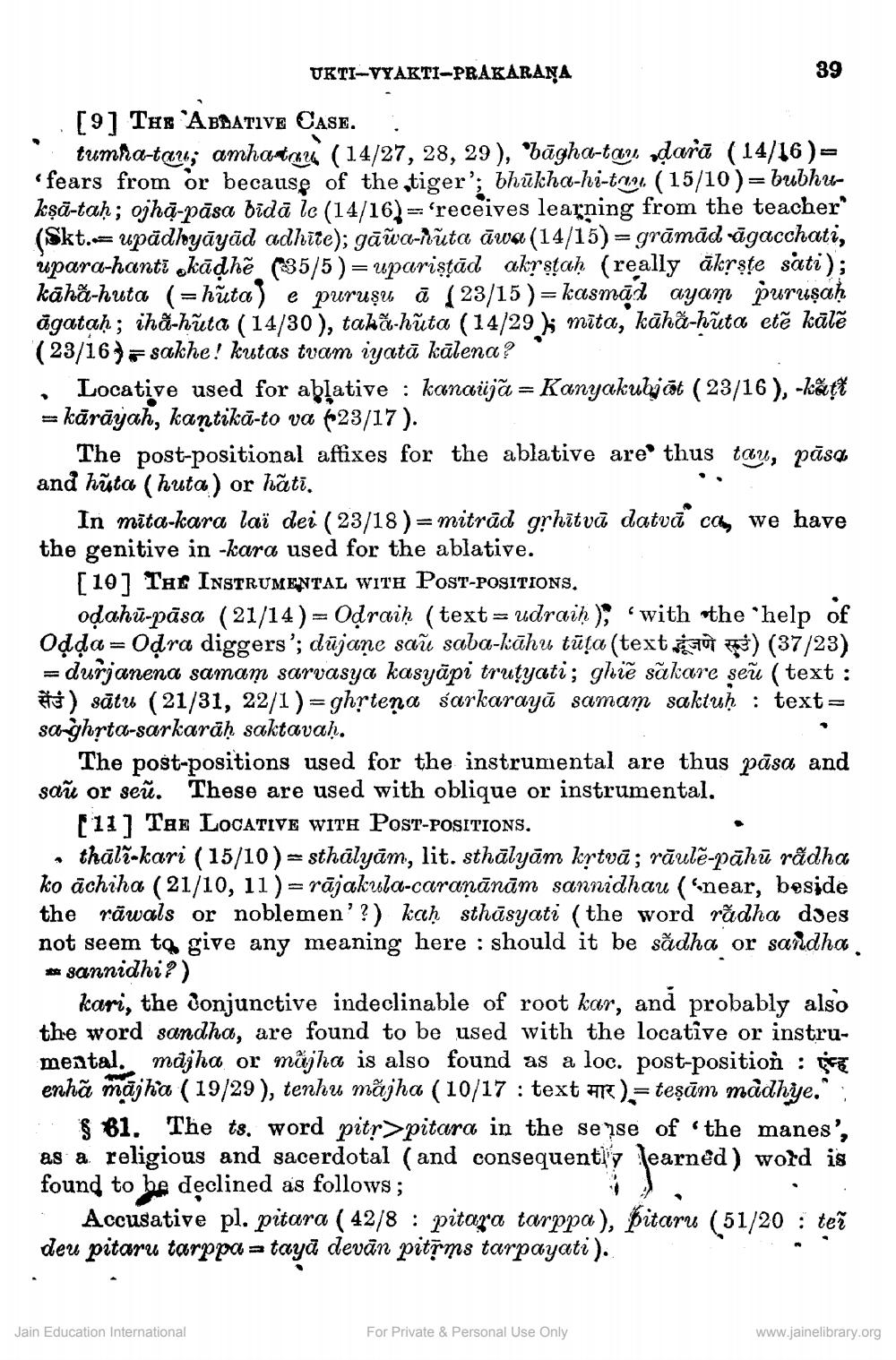________________
UKTI-VYAKTI-PRAKARANA
39
[9] The ABDATIVE CASE.
tumna-tau, amhana (14/27, 28, 29), 'bāgha-tay, darā (14/16 )"fears from or because of the tiger'; bhūkha-hi-t09. (15/10)= bubhukşā-taḥ; ojhā-pāsa bida lc (14/16)= 'receives learning from the teacher" (Skt.-upādhyāyād adhite); gāūc-nūta āwa (14/15)= grāmādāgacchati, upara-hantī kādhë (35/5) = uparistād akrstah (really äkrste sati); kāhă-huta (=hūta) e puruşu ā (23/15 ) = kasmad ayam puruṣaḥ āgataḥ; ihă-núta (14/30), takã-hūta (14/29 ); mita, kāhă-huta etē kālē (23/16) -sakhe! kutas tvam iyatā kālena? · Locative used for ablative : kanaijā = Kanyakubjät (23/16), -katt = kārāyah, kantikā-to va (23/17).
The post-positional affixes for the ablative are thus tau, pāsa and hūta (huta) or hãtī.
In mita-kara laï dei (23/18 )= mitrād grhitvā datvã cohe, we have the genitive in -kara used for the ablative.
[10] THE INSTRUMENTAL WITH POST-POSITIONS.
odahü-pāsa (21/14 ) = Odraiḥ (text = udraih); with the help of Odda=Odra diggers'; dūjane saī saba-kāhu tūța (text ESO ) (37/23) = durjanena samam sarvasya kasyāpi trutyati; ghiệ săkare señi ( text: #3 ) sātu (21/31, 22/1 )=ghrtena sarkarayā samam saktuḥ : textsağhrta-sarkarāḥ saktavah.
The post-positions used for the instrumental are thus pāsa and saī or seữ. These are used with oblique or instrumental.
[11] TAE LOCATIVE WITH Post-POSITIONS. , thālī-kari (15/10 )=sthalyām, lit. sthālyām krtvā; rāule-pāhū rādha ko achiha (21/10, 11 )= rājakula-caraṇānām sannidhau (near, beside the rāwals or noblemen'?) kah sthāsyati (the word rădha dues not seem to give any meaning here : should it be sădha or sandha. #sannidhi?)
kari, the donjunctive indeclinable of root kar, and probably also the word sandho, are found to be used with the locative or instrumental. májha or măjha is also found as a loc. post-position : site enhā mājha (19/29), tenhu môjha (10/17 : text ar ),= teşām madhye." ;
§ 81. The ts. word pitr>pitara in the sense of the manes', as a religious and sacerdotal (and consequently learned) word is found to be declined as follows;
Accusative pl. pitara ( 42/8 : pitara tarppa), bitaru (51/20 : teñ deu pitaru tarppa = tayā devān pitīms tarpayati).
Jain Education International
For Private & Personal Use Only
www.jainelibrary.org




